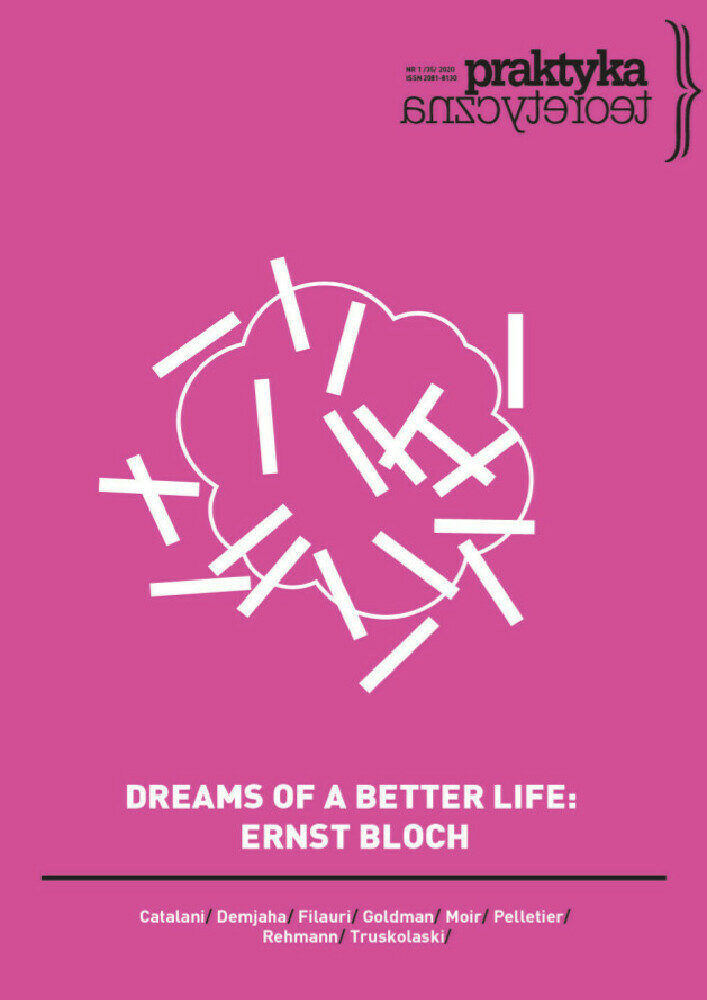Abstrakt
Tematem tekstu jest pojęcie „metareligii” Ernsta Blocha, będące próbą zachowania tego, co religijne, bez zachowywania religii, w sposób inny jednak niż czyni to czysto świecki ateizm. Skupiając się głównie na późnym dziele Blocha Ateizm w Chrześcijaństwie pokażę, że postrzegał on Feuerbacha jako prekursora swojego meta-religijnego projektu. Następnie przejdę do głównego problem – tego, co Bloch nazywa meta-religijnym dziedzictwem chrześcijaństwa: kwestii Upadku. Jak dowodzę, archetyp Upadku – co często sugeruje sama myśl Blocha – jest koniecznym korelatem archetypu wolności. Archetyp ten ugruntowuje także Blochowską metareligię zarówno w dziedzictwie chrześcijaństwa, jak i dziedzictwie Hegla, którzy traktowani są w niej jako dwie strony tej samej dialektycznej teoretyzacji źródeł marksizmu.
Bibliografia
Baader, Franz. 1851. Baaders Sämmtliche Werke vol. 2. Edited by Franz K. Hoffman. Leipzig: Verlag von Herrmann Bethmann.
Bonaventure. 2012. Breviloquium Et Itinerarium Mentis Ad Deum. Edited by Hefele. C.J. Charleston: Nabu Press.
Bloch, Ernst. 1968. Aheismus im Christentum. Frankfurt am Main: Suhrkamp Verlag.
———. 1962. “Hegel und die Anamnesis.” Hegel Studien 1: 167–181.
———. 1996. Tübinger Einleitung in die Philosophie. Frankfurt am Main: Suhrkamp.
———. 1969. “Universität, Marxismus, Philosophie.” In Philosophische Aufsätze, 277–278. Frankfurt am Main: Suhrkamp.
Berthold-Bond, Daniel. 1995. Hegel’s Theory of Madness. New York: State University of New York.
Chesterton, Gilbert Keith. 2011. The Quotable Chesterton. Edited by K. Belmonte. Nashville, TN: Thomas Nelson.
Colletti, Lucio. 1972. From Rousseau to Lenin. Translated by J. Merrington and J. White. London: Lowe and Brydone.
Feuerbach, Ludwig. 1881. The Essence of Christianity. Translated by M. Evans. London: Trübner & Co., and Ludgate Hill.
———. 2012. The Fiery Brook. Translated by Z. Hanfi. London: Verso.
Geoghegan, Vincent. 1996. Ernst Bloch. London: Routledge.
Glenn Friesen. 2015. Neo-Calvinism and Christian Theosophy: Franz von Baader, Abraham Kuyper, Herman Dooyeweerd, Calgary: Aevum Books.
Hegel, G.W.F. 1948. “The Positivity of the Christian Religion.” In Early Theological Writings. Translated by T.M. Knox. Chicago IL: University
of Chicago Press.
———. 1969. Vorlesungen über die Philosophie der Religion I, Werke 16. Edited by E. Moldenhauer & K. M. Michel. Frankfurt am Main: Suhrkamp.
———. 1991. Encyclopaedia Logic. Translated by T.F. Geraets et al. Cambridge: Hackett Publishing.
———. 2008. Philosophy of Mind. Translated by M. Inwood et al. Oxford: Oxford University Press.
———. 2010. Science of Logic. Translated by George Di Giovanni. Cambridge: Cambridge University Press.
Hodgson, Peter C. 2005. Hegel and Christian Theology. Oxford: Oxford University Press.
Hudson, Wayne. 1982. The Marxist Philosophy of Ernst Bloch. London: Macmillan.
Jameson, Fredric. 2016. Marxism and Form. Princeton, NJ: Princeton University Press.
Ling, Trevor. 1980. Karl Marx and Religion in Europe and India. London: Macmillan.
Marx, Karl, and Friedrich Engels. 1964. “The German Ideology”. In On Religion. New York, NY: Schocken.
———. 1975. Collected Works vol. 1. London: Lawrence and Wishart.
Milbank, John. 2006. Theology and Social Theory. Oxford: Blackwell.
Mondin, Battista. 1963. The Principle of Analogy in Protestant and Catholic Theology. New York, NY: Springer.
Plotinus. 1988. Enneads. Translated by A.H. Armstrong. London: Harvard University Press.
Taylor, Charles. 1991. Ethics of Authenticity. London: Harvard University Press.
Wolfson, Harry A. 1948. Philo vol. 1. Cambridge: Harvard University Press.
Licencja
Autorzy:
„Praktyka Teoretyczna” jest pismem, które chce realizować idee wolnego dostępu do wiedzy i poszerzania domeny dobra wspólnego. Ma służyć rozwojowi nauki i krytycznej refleksji w Polsce i na świecie w imię idei wolnego dostępu do wiedzy (Open Access). Całe pismo jest udostępniane za darmo w Internecie na warunkach licencji CC-BY-NC-SA (Uznanie autorstwa-Użycie niekomercyjne-Na tych samych warunkach 4.0 Międzynarodowe) w wersji 4.0 (szczegółowe warunki: http://creativecommons.org/licenses/by-nc-sa/4.0/). Artykuły w nim zamieszczone mogą być dowolnie przechowywane, kopiowane, drukowane, rozpowszechniane i wykorzystywane do celów naukowo-dydaktycznych przy zachowaniu warunków licencji. Apelujemy tylko o uznanie autorstwa i podanie źródła w myśl przyjętych w środowisku naukowym standardów.
Nie ma natomiast możliwości komercyjnego wykorzystania zgromadzonych zasobów bez pisemnej zgody wydawcy. Dostęp do czasopisma nie może być dystrybuowany za opłatą czy w jakikolwiek inny sposób limitowany przez inne podmioty.
Autorzy tekstów przyjętych do publikacji w czasopiśmie „Praktyka Teoretyczna” są zobowiązani do wypełnienia, podpisania i odesłania na adres redakcji umowy o udzielenie nieodpłatnej licencji do utworów, z zobowiązaniem do udzielania sublicencji CC [PL.pdf, PL.doc, EN.pdf, EN.doc].
Zgodnie z umową, autorzy tekstów opublikowanych w czasopiśmie „Praktyka Teoretyczna” udzielają wydawcy czasopisma niewyłącznej i nieodpłatnej licencji oraz zezwalają na użycie sublicencji Creative Commons Uznanie autorstwa-Użycie niekomercyjne-Na tych samych warunkach 4.0 Międzynarodowe (CC-BY-NC-SA 4.0).
Autorzy zachowują prawa do dalszego, swobodnego rozporządzania utworem.
Autorzy nadsyłanych artykułów powinni upewnić się, czy wykorzystywane przez nich materiały nie są chronione prawami autorskimi na rzecz innych osób i ponoszą odpowiedzialność za ewentualne uchybienia w tym względzie.
